考研倒计时天英语词汇背诵计划.doc
考研英语最后60天复习计划
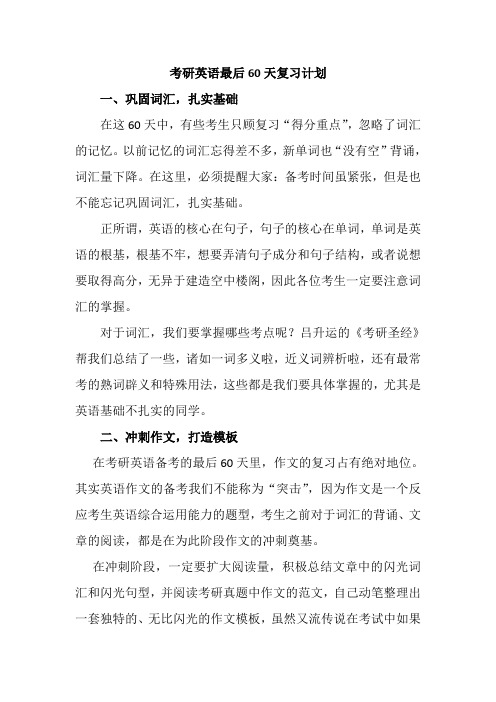
一、巩固词汇,扎实基础
在这60天中,有些考生只顾复习“得分重点”,忽略了词汇的记忆。以前记忆的词汇忘得差不多,新单词也“没有空”背诵,词汇量下降。在这里,必须提醒大家:备考时间虽紧张,但是也不能忘记巩固词汇,扎实基础。
正所谓,英语的核心在句子,句子的核心在单词,单词是英语的根基,根基不牢,想要弄清句子成分和句子结构,或者说想要取得高分,无异于建造空中楼阁,因此各位考生一定要注意词汇的掌握。
此外,对文章的长难句、文章的选材,也都值得细细研究。对阅读理解开启超精读模式,对段落翻译与写作进行重点突破,切忌囫囵吞枣。需要注意的是,在最后的60天里,不要肢解真题,今天做阅读,命题写作文,后天做翻译,这样就打破了做题的连贯性,不利于培养做题“手感”。
由于真题是有限的,为了考前实战模拟,最好留三套题最后再做。如果实在怕麻烦,也可以用铅笔来答题,这样就可以“反复利用”真题啦。
在冲刺阶段,一定要扩大阅读量,积极总结文章中的闪光词汇和闪光句型,并阅读考研真题中作文的范文,自己动笔整理出一套独特的、无比闪光的作文模板,虽然又流传说在考试中如果使用雷同模板,作文得分会很低,但是如果在考场上运用自己总结出的闪光模板,相信一定会获得阅卷老师的“青睐”。
三、真题为纲,保持手感
众所周知,真题就是考生最好的备考参考书,所以考生对题型的分析和回顾是十分重要的,考研真题中命题的问法或者说是设题点值得考生研究的重点,有的同学说:我的文章都看懂了,就是题目做不对。这就是真题的魅力,这就是为什么要研究题设的原因。
对于词汇,我们要掌握哪些考点呢?吕升运的《考研圣经》帮我们总结了一些,诸如一词多义啦,近义词辨析啦,还有最常考的熟词辟义和特殊用法,这些都是我们要具体掌握的,尤其是英语基础不扎备考的最后60天里,作文的复习占有绝对地位。其实英语作文的备考我们不能称为“突击”,因为作文是一个反应考生英语综合运用能力的题型,考生之前对于词汇的背诵、文章的阅读,都是在为此阶段作文的冲刺奠基。
关于考研英语词汇复习计划词汇复习
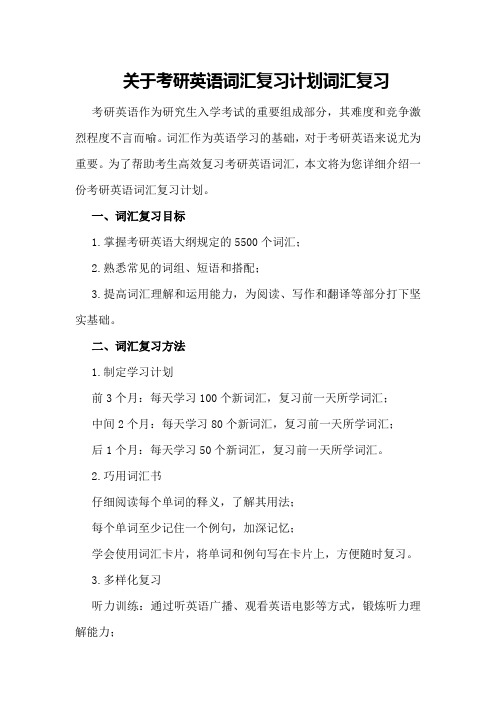
关于考研英语词汇复习计划词汇复习考研英语作为研究生入学考试的重要组成部分,其难度和竞争激烈程度不言而喻。
词汇作为英语学习的基础,对于考研英语来说尤为重要。
为了帮助考生高效复习考研英语词汇,本文将为您详细介绍一份考研英语词汇复习计划。
一、词汇复习目标1.掌握考研英语大纲规定的5500个词汇;2.熟悉常见的词组、短语和搭配;3.提高词汇理解和运用能力,为阅读、写作和翻译等部分打下坚实基础。
二、词汇复习方法1.制定学习计划前3个月:每天学习100个新词汇,复习前一天所学词汇;中间2个月:每天学习80个新词汇,复习前一天所学词汇;后1个月:每天学习50个新词汇,复习前一天所学词汇。
2.巧用词汇书仔细阅读每个单词的释义,了解其用法;每个单词至少记住一个例句,加深记忆;学会使用词汇卡片,将单词和例句写在卡片上,方便随时复习。
3.多样化复习听力训练:通过听英语广播、观看英语电影等方式,锻炼听力理解能力;口语练习:与同学或老师进行英语对话,提高口语表达能力;阅读理解:阅读英语文章,提高阅读速度和理解能力;写作训练:将所学词汇运用到写作中,提高写作水平。
4.定期检测每周进行一次词汇小测,检测本周所学词汇;每月进行一次词汇大测,检测本月所学词汇;参加模拟考试,检验自己在实际考试中的词汇运用能力。
三、词汇复习注意事项1.坚持学习:词汇学习是一个长期的过程,需要考生保持持续的学习热情和毅力;2.注重实际应用:在学习过程中,要将所学词汇运用到实际场景中,提高词汇运用能力;3.合理安排时间:在学习计划中,要合理分配时间,保证各个阶段的复习效果;4.及时复习:在学习过程中,要及时复习所学词汇,避免遗忘;5.调整学习策略:根据自身学习情况,适时调整学习计划和方法,提高学习效率。
补充点:6.利用词根词缀记忆:英语词汇中有许多词根词缀,掌握这些词根词缀能够帮助考生更快地记忆和理解新词汇。
通过学习词根词缀,考生可以推断出陌生单词的大致意思,提高词汇学习效率。
考研英语周计划分级词汇记忆宝典电子

考研英语周计划分级词汇记忆宝典电子全文共6篇示例,供读者参考篇1Title: The Magical Memory Book for Big Word Adventures!Hey there, word explorers! Are you ready for an exciting journey into the world of big, juicy words? Get ready to become a vocabulary master with this fantastic weekly plan. It's like having your very own magical memory book that will help you conquer those tricky words for your big English exams!Monday: The KickoffMondays are all about making a fresh start. Grab your magical memory book (or a regular notebook if you haven't found the magical one yet) and write down the new words you want to learn this week. Don't worry if there are a lot of them –we'll tackle them one step at a time!Now, let's get to know these new words a little better. Look up their meanings and try to understand them. If you're feeling extra adventurous, you can even draw little pictures or doodles next to the words to help you remember them better. Whoknows, maybe your doodle of a "microscopic" ant will help you never forget that word!Tuesday: The Rhyme TimeTuesdays are for getting those words stuck in your head with some silly rhymes and songs! Come up with funny phrases or little tunes to help you remember the words and their meanings. For example, you could sing "The 'anonymous' person has no name, but their secret message still came!" before you go to bed.Wednesday: The Story SpinOn Wednesdays, we'll weave the words into exciting stories! Take a few of the new words and create a wild, imaginative tale using them. Maybe you'll write about a "diligent" student who solves a "perplexing" mystery while avoiding the "disdain" of their grumpy neighbor. The sillier the story, the better you'll remember those big words!Thursday: The Game ZoneThursdays are all about turning word practice into fun and games! You can play charades with your family, acting out the meanings of the words without speaking. Or, you could have a rhyming competition, taking turns coming up with rhymes foreach new word. Who knows, you might even invent a brand new game that's both educational and entertaining!Friday: The Review RodeoFridays are for reviewing all the words you've learned so far this week. Make flashcards, take practice quizzes, or even have a friendly competition with your friends or siblings to see who can use the most new words in a sentence or story.Saturday: The Real-World RompOn Saturdays, it's time to take those words out for a spin in the real world! Pay attention to conversations, books, movies, or even signs and labels around you, and see if you can spot any of the new words you've learned. Hearing and seeing them used in different contexts will help cement them in your memory.Sunday: The Celebration StationSundays are for celebrating your hard work and progress! Treat yourself to your favorite snack or activity as a reward for all your word-learning efforts this week. You've earned it, word explorer! And don't forget to give your magical memory book a high-five – it's been working overtime to help you become a vocabulary superhero.And there you have it, fellow word adventurers! Follow this weekly plan, and those big, scary words won't seem so intimidating anymore. With a little bit of creativity, fun, and determination, you'll be unstoppable on your quest to conquer the vocabulary for your big English exams. So grab your magical memory book, and let's get started on this exciting journey together!篇2A Weekly Vocab Plan for Big Kid School EnglishHi friends! Today I'm gonna share my awesome plan for learning lots of new English words to get ready for big kid school. My goal is to do really well on the English test for grad school. That's a fancy name for the school you go to after college to learn even more stuff!The first step is making word lists. Every Sunday, I go through my vocab books and pick out 20-25 new words I don't know yet. I write them down in my special vocab notebook. Having the words in one place makes it way easier to study them during the week.Next, I look up each word in the dictionary and write down the definition, part of speech, and a simple example sentence.Dictionaries are like vocab superheroes - they have all the answers! The definition tells me what the word means. The part of speech lets me know if it's a noun, verb, adjective, etc. And the example shows me how to use it in a regular sentence.Then I make flashcards for all the words. On one side I write the word, and on the other I put the definition, part of speech, and example. Flashcards are my favorite tool for memorizing new terms. I can quiz myself over and over until the words really stick in my brain.Each day after school, I spend 30 minutes reviewing my flashcards and repeating the words out loud. Hearing myself say them helps me remember better. If there are words I keep forgetting, I make a note to spend some extra time on those ones.I also try to use as many of the new vocab words as I can when writing sentences or paragraphs. Using the words in my own writing makes them easier to understand and helps make sure I know how to use them correctly.Another smart trick is finding the roots, prefixes, and suffixes in words. Like "uni" means one, so "unicorn" is a one-horned animal. Breaking words into their meaningful parts gives meclues about their definitions and makes them simpler to memorize.On Saturday, I take a practice quiz to test how many of the new terms I've learned that week. I give myself a big sticker or treat for every word I get right to celebrate my hard work!Then on Sunday, it's time to pick a fresh set of 20-25 new words to start the cycle again for the next week. Consistency is key - repeating these steps every week helps me acquire vocabulary a little bit at a time without getting overwhelmed.Learning all these big grown-up English words can definitely feel like a lot of work sometimes. But I remind myself that it's an investment in my future goals and dreams. Maybe I'll become a scientist and need to read lots of academic papers. Or maybe I'll write books someday and need a giant vocabulary to tell my stories. Or maybe I'll end up teaching English to kids just like me one day!No matter what path I choose, a strong mastery of English vocabulary will open up so many amazing opportunities for me. That's what motivates me to stick with my weekly vocab plan. I'm exercising my brain and giving it the language skills to explore the world. How cool is that?Okay vocabulary lovers, those are my tips for building your word power step-by-step. Let me know if you have any other genius ideas to share! Now get out there and start learning - the English language awaits!篇3Hello friends! Today I want to share with you my super awesome plan for learning all the big vocabulary words for the graduate English entrance exam. I'm going to be a master of words by the time I take that test!First, you need to get yourself a nice big notebook just for vocabulary words. Decorate the cover with your favorite stickers and drawings to make it fun. Inside, make a page for each letter of the alphabet from A to Z. That's where you'll write down all the new words you learn.Every week, I pick out 25 new vocabulary words to focus on. I write them all down on the correct alphabet page in my notebook. For each word, I write down the definition or translation in my own language. That way I can quickly see what it means when I'm studying.Then comes the really fun part - making those words stick in my brain! There are lots of cool ways to practice new vocabulary.One thing I like to do is make flashcards. I write the word on one side and the definition on the other. Flashcards let me quiz myself or have someone else quiz me.Another neat trick is using the words in silly sentences or stories. Like if one of the words is "perambulate", I might say something like "The perambulating penguin waddled down the street with his umbrella." Making up goofy sentences helps the words stick better in my mind.You can also look for connections between the new words and things you already know. Like if the word is "combustible", you might think about fire, matches, and things that can burn. Building those links makes it easier to remember.My favorite way to practice though is with games! You can play hangman, competitive wordscrambles, or make up rhymes and raps using the vocab words. Turning it into a game makes studying way more fun.Don't just practice on your own though - get your family and friends involved too! Maybe your parents can quiz you over breakfast. Or you can teach the new words to your little brother or sister and have them test you later.It's also really important to keep reviewing and refreshing on old words, not just practicing the brand new ones each week. I keep a section in my notebook for words I've already learned, and I'll flip back through those pages too when I'm studying.Some words will stick right away, but others might take a while before you really have them locked into your brain. Don't get frustrated - just keep at it! The more creative and consistent you can be with your practice, the faster everything will stick.Oh, and here's a pro-tip! Use those fancy vocabulary words as much as you can in your everyday life. Like you could say "The delectable aroma from the kitchen is enticing me to inquire about the appetizing meal you are preparing." See how I worked some big words in there? It'll really impress your parents and teachers.With a few months of studying like this, I'll be the vocabulary master of my class. Those entrance exam words won't stand a chance against me! Just you wait, I'm going to perambulate right into that graduate program. Okay, maybe I've got a little more practicing to do on that one. But I'm well on my way!Let me know if you have any other awesome study tricks for learning piles of new vocabulary. Us word nerds have to sticktogether! Okay, time for me to get back to my flashcards. Vocabulary, here I come!篇4Vocabulary Categorization and Memory Strategies for GRE PreparationHey kids! Are you getting ready to take the GRE someday to get into a fancy graduate school? Well, one of the biggest parts of the GRE is the vocabulary section. There are tons of big, strange words you'll need to know. But don't worry, I'm here to help make learning those words fun!First off, you'll want to break the words down into categories. Categorizing the words can make them much easier to remember. Let's go through some examples of categories you can use:Word RootsLots of big vocabulary words have roots from other languages like Greek or Latin. If you learn some common roots, it'll unlock the meanings of tons of words! For example, the root "bio" means life. So "biology" is the study of life, and "biography" is the story of someone's life.Word FamiliesSimilar to roots, you can group words into families based on a shared root or prefix/suffix. Like the "port" family - transport, portable, import, export, etc. If you learn the shared meaning, it's easier to figure out the specifics.Subjects/TopicsYou can also categorize words based on what subject they're related to - like words about science, words about government, words about emotions, and so on. Making those connections helps cement them in your brain.Now that you've got categories set up, here are sometop-secret memory tips to truly lock those GRE words into your brain vault:Make Up StoriesOne of the best ways to remember something is by making it into a silly story that you'll never forget. Like if you need to learn the word "plethora" (which means too many), you could make up a story about a town overrun by a plethora of playful platypuses! The crazier the story, the more it'll stick.Use Vivid VisualizationsSort of like the story trick, you can remember words by picturing strong visuals. Like for "loquacious" (someone who talks a lot), you could picture a loudmouth parrot squawking nonstop. Strange visuals are harder to forget.Make ConnectionsTry to connect new vocabulary words to things you already know really well. Like if you're learning "melancholy" (sadness), you could think about how you feel melancholy when your favorite TV show gets canceled.Songs/RapsWhat kid doesn't love singing silly songs? You could make up a rap or song about GRE words to make them easier to memorize. Get your rhymes on!FlashcardsThis one's a classic study method, but it works! Write the word on one side of a card and the definition on the other. You can quiz yourself or have someone else quiz you.GamesTurn vocab practice into a game to make it more fun. You could do a Hangman-style game, or scatter words around aroom and toss a ball to "splat" one for the other team to define. Games = good times.Use The WordsOne of the best ways to truly learn a new word is to start using it yourself in your writing or when you speak. It'll become a natural part of your vocabulary.Well, hopefully these category ideas and memory tricks will turn prepping those GRE words from a total snorefest into something almost...fun? Hey, I tried!Just remember, a big vocabulary opens up worlds of knowledge and opportunities. So study hard and make those GRE words your friends. You've got this!篇5My Weekly Plan for Remembering Big Words for the Graduate TestHi friends! My name is Emma and I'm going to share my super cool plan for remembering all the big vocabulary words I need to know for the big English test to get into graduate school. It's called the GRE and has some really tricky words on it. But don't worry, my plan will help you remember them easily!The most important thing is to make it fun. If it's boring, you'll never stick with it. That's why my plan has games, colors, movements, and even some tasty treats involved. Are you ready? Let's go!Monday: It's The BasicsOn Monday, I start with the easiest words first. These are words I sort of know, but maybe not the exact meaning. I make basic flashcards with the word on one side and a simple picture on the other side.Then I get a big bottle of my favorite juice and some small cups. I put a card down, say the word out loud, and take a gulp of juice if I know what the simple picture means. If not, I don't get juice until I learn it. Yum!Tuesday: Just Move ItNow that I know the basic words, on Tuesday I rev it up a notch. I take all the words I missed on Monday's juice test and make movements for each one. If the word is "abrogate" which means to cancel, I might make a slashing movement with my arms.I get my whole family involved, even my baby brother. We all make the movement when I say the word. If I forget, they get togently bop me on the head with a cozy pillow! It's silly fun to help me remember.Wednesday: Time to RhymeRhyming is amazing for remembering hard words. On Wednesdays, I take all the tricky words I've been practicing and make up rhymes or raps about them.For example, for the word "ameliorate" which means to make better, I might rhyme: "If your grades are looking sadder, just study to make them gladder...ameliorate!" Then I perform the rhymes while marching around with a big colorful hat on.Thursday: Snack Attack!Everybody loves snacks, right? On Thursdays, I get to enjoy yummy snacks but only if I can use the vocabulary words correctly in sentences first.Let's say the word is "ephemeral" which means lasting a very short time. I might say "Shooting stars are so ephemeral, they're gone in a flash!" If I'm right, I get a small pack of M&Ms. Mmm, motivating!Friday: Construction TimeThis is where I build my big palabras (that's "words" in Spanish)! On Fridays, I get out my heaviest books, Legos, blocks, anything I can arrange and stack.I make a construction representing the meaning of each new word I've learned that week. For "plethora" which means too much of something, I might stack tons of books tottering every which way. Then I photograph it to make my own flashcards.Saturday: The Game ZoneIt's game day! I've invited all my friends over and we invent new games using the week's vocabulary words. Becca is really good at coming up with rhyming games. Miguel likes running around and acting out words with movements.We take turns being the "Word Master" and everyone else has to guess the right word. We keep score and the Word Master gives out fun pencils or stickers as prizes.Sunday: Chillaxing ReviewAfter all that hard work, I take it easy on Sundays. I sprawl out on my bed or a cozy couch and listen to instrumental music.Then I simply go through all my flashcards for the week, including my constructions that I photographed. I don't quizmyself, just look at them casually while sipping hot chocolate. It's the perfect relaxing review!That's my weekly plan, friends! Mondays through Saturdays I use games, snacks, movements, and more to drill those big GRE vocabulary words into my brain. Sundays I just chill and review.Will I be an absolute vocab master by test day? You betcha! This way, preparing for the GRE is super duper fun. Try out my weekly plan and those impressive palabras will stick with you for good. Vocabfest!篇6The Wonderful Word Adventure!Hi there, friends! Are you ready for an exciting journey into the land of words? Today, we're going to explore the magical world of vocabulary, and I'll share with you a super fun plan to help you remember lots of new words every week. Get ready to become a word wizard!First things first, let's talk about why it's so important to learn new words. You see, words are like building blocks that help us communicate with others and understand the world around us. The more words you know, the better you can express yourselfand the more you can learn from books, movies, and conversations. It's like having a secret code that unlocks new adventures and discoveries!Now, let's dive into our weekly plan for memorizing graded vocabulary. We'll break it down into seven days, each with its own set of fun activities. Are you ready? Let's go!Day 1: The Word HuntOn the first day of the week, we'll go on a word hunt! Grab a dictionary or find a list of new words you want to learn. Look at the words and try to guess their meanings from the way they sound or look. It's like being a detective, solving the mystery of each word's secret identity!Day 2: Picture PerfectToday, we're going to use our imagination to create picture stories for our new words. For each word, draw a silly picture or imagine a funny scene that helps you remember its meaning. The sillier the better! This way, you'll never forget these words, and you'll have a blast doing it.Day 3: Word CharadesIt's time to get moving! Today, we'll play a game of word charades with our new vocabulary. Act out the meanings of thewords without speaking, and see if your friends or family can guess what you're trying to say. This is a great way to associate the words with actions and movements, making them stick in your mind like glue.Day 4: Word FamiliesDid you know that some words are related to each other? They belong to the same word family! Today, we'll explore these word families and learn how to recognize them. For example, if you know the word "happy," you can easily guess the meanings of words like "happiness," "unhappy," and "happily." It's like having a bunch of word cousins!Day 5: Rhyme TimeLet's get creative and make up silly rhymes or songs using our new words. Rhymes are great for memorizing becausethey're fun to say and stick in your head like a catchy tune. Who knows, you might become the next Dr. Seuss of vocabulary!Day 6: Word GamesToday, we'll play all sorts of word games to reinforce our new vocabulary. We can have a spelling bee, play hangman, or even create our own word puzzles or crosswords. Games makelearning feel like playtime, and before you know it, those words will be ingrained in your memory forever.Day 7: The Word ParadeOn the last day of the week, it's time to celebrate your word-learning accomplishments! Gather your friends and family and have a word parade. Each person can dress up as one of the new words and act out its meaning. You can even make costumes and props to bring the words to life. It'll be a fun-filled day of laughter and learning!There you have it, friends – a whole week of exciting adventures in the world of words! By following this plan, you'll not only learn new vocabulary but also have a blast doing it. Remember, the more words you know, the more doors will open for you in life. So, let's embark on this word-filled journey together and become the ultimate word wizards!。
考研英语冲刺阶段词汇背诵计划

考研英语冲刺阶段词汇背诵计划考研英语冲刺阶段词汇背诵计划写作能力的提高不可能一蹴而就,必须经过长期的实践锻炼,重点要注意语域和格式两个问题。
店铺为大家精心准备了考研英语冲刺阶段词汇背诵技巧,欢迎大家前来阅读。
考研英语冲刺阶段词汇背诵规划冲刺阶段1、背单词。
再将单词从头至尾背一遍,直到考试,单词至少要背三遍如果学有余力。
掌握拼写,另外,将所做的阅读真题里的陌生单词都整理到一张纸上,不要写中文意思只写英文然后每天有空拿出来背一背,效果显著,单词是基础。
2、练听力。
这个阶段一定要开始练习历年真题的听力了,每天做一篇即可,与背单词相同的是,也要将听力文章里出现的陌生单词整理到纸上,不标注中文意思,找空闲时间、背一背在听听力的时候要训练自己只听一遍。
不可以一道题听很多遍那样事倍功半,在听听力题的最后一个大题,复合式听写时听句子时候听主干。
只写主干,一样得分。
3、做阅读。
将做过的阅读再重新看看,哪里还有不懂及时解决。
在做快速阅读时,不要先看文章,要先看题目,从题目去文章中定位做大阅读的方法一样。
4、写作。
四六级的写作可以说就是考议论文,议论文就是分三段每一段的句首的作用举重若轻。
所以背作文框架很重要。
5、翻译。
同样,将历年真题一道一道的认真做下来,每做完几年的就做一个对比,会发现知识点都是重复出现的,所以翻译相对简单。
另外,如果认为背单词太累且记不住,还可以尝试这样一种方法从基础阶段就开始做真题。
在阅读中去背单词将所有不会的单词都记录下来,整理到本子上,背就可以了。
但是这种方法并不是很扎实,因为既然想考六级了,就是想考研了,基础还是要打牢比较好。
考研英语应用文写作不可一蹴而就小作文备考重“形式”这里的“形式”指的是应用文的类型,小作文考察的一般是应用文文体,多是辞职信、道歉信、感谢信等20多种类型。
小作文不需要华丽的词藻和吸引阅卷人眼球的文采,它着重考察的是考生能否以言简意赅的词句及一定的逻辑性,它需要考生将题目中的要求表达清楚,这非常考验考生的总结概括能力,换言之就是看考生能否将事情叙述清楚,表意明确。
考研英语倒计时冲刺计划

特种车辆驾驶员岗位职责
1、严格执行公司、厂部的各项规章制度,服从领导,必须保证车
辆的工作时间。
2、确保设备润滑良好,保持设备的清洁。
3、定期更换设备的三个过滤器和各种机油,保证设备的正常运行。
4、严格按规程操作,保质保量地完成工厂交办的工作。
5、厉行节约,最小化车辆行程。
6、未经许可,不得擅自使用自己操作的设备,带徒工的驾驶员,
徒工操作时师傅必须随车监护。
7、作业时必须确认作业周围环境,做到既保证车辆的安全,并确
保周围环境中其他物品的安全,使工作干净利落。
8、因人为造成事故,事故责任人承担事故损失30%,并扣除当月
奖金。
9、不负责工作,不服从领导,表现恶劣者,予以除名。
10、各种车辆的养护、详细记录维护和事故,以便年终评比备查。
中兴矿业公司选矿厂。
英语单词背诵21天计划表
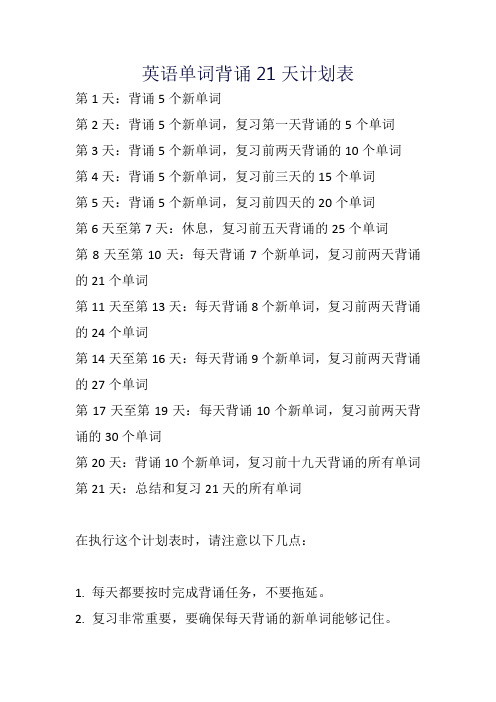
英语单词背诵21天计划表
第1天:背诵5个新单词
第2天:背诵5个新单词,复习第一天背诵的5个单词
第3天:背诵5个新单词,复习前两天背诵的10个单词
第4天:背诵5个新单词,复习前三天的15个单词
第5天:背诵5个新单词,复习前四天的20个单词
第6天至第7天:休息,复习前五天背诵的25个单词
第8天至第10天:每天背诵7个新单词,复习前两天背诵的21个单词
第11天至第13天:每天背诵8个新单词,复习前两天背诵的24个单词
第14天至第16天:每天背诵9个新单词,复习前两天背诵的27个单词
第17天至第19天:每天背诵10个新单词,复习前两天背诵的30个单词
第20天:背诵10个新单词,复习前十九天背诵的所有单词第21天:总结和复习21天的所有单词
在执行这个计划表时,请注意以下几点:
1. 每天都要按时完成背诵任务,不要拖延。
2. 复习非常重要,要确保每天背诵的新单词能够记住。
3. 在背诵过程中,可以使用各种记忆技巧,如联想记忆、语境记忆等。
4. 坚持是关键,不要因为一时的困难而放弃。
5. 在背诵过程中,可以结合阅读、听力等其他语言学习活动,以巩固所学单词。
2024考研英语最后20天高效复习方案

2024考研英语20天高效复习方案哎呦,同志们,转眼间就到了考研英语20天的复习关头啦!这可是最最关键的时刻,大家可得提起精神,抓住每一个可以利用的碎片时间,高效复习,把英语这个“硬骨头”啃下来!下面我就来给大家分享一份“高效复习方案”,让咱们在这的冲刺阶段,一鼓作气,拿下英语!一、梳理重点,明确复习方向1.词汇:词汇是英语的基础,咱们的目标是在这20天内,把考研英语的核心词汇过一遍。
每天至少抽出2小时来背单词,可以使用词汇书、APP等多种方式,重点是强化记忆,确保考试时能够快速准确识别和使用。
2.语法:语法是英语的框架,对于提高阅读理解能力、写作水平都有很大帮助。
在这20天里,重点复习常见的语法知识点,如动词时态、语态、非谓语动词等。
每天至少抽出1小时来复习语法,可以结合专项练习进行巩固。
3.阅读理解:阅读理解是考研英语的重头戏,占分比重很大。
这20天里,我们要重点练习阅读技巧,提高阅读速度和理解能力。
每天至少抽出2小时来练习阅读,可以选择历年真题、模拟题进行训练。
4.写作:写作是考研英语的难关,但只要掌握了一定的技巧和方法,还是可以取得不错的分数的。
在这20天里,我们要重点练习写作,每天至少抽出1小时来练习写作,可以参考范文、模板进行模仿和创作。
二、合理分配时间,提高复习效率1.制定学习计划:根据个人实际情况,制定详细的复习计划,明确每天的学习任务。
这20天里,要保证每天至少有6小时的高效学习时间。
2.分阶段复习:将20天分为两个阶段,前10天重点复习词汇、语法,后10天重点练习阅读理解和写作。
3.交叉复习:为了避免单一学习内容导致的疲劳,可以采用交叉复习的方式,如:词汇、语法、阅读、写作交叉进行。
三、实战演练,查漏补缺1.模拟考试:在20天里,至少进行2次全真模拟考试,检验自己的复习效果,同时熟悉考试流程和题型。
2.分析错题:针对模拟考试中的错题,进行深入分析,找出自己的薄弱环节,有针对性地进行复习。
100天倒计时:考研英语攻坚复习计划.doc

100天倒计时:考研英语攻坚复习计划英语考研已经进入100天倒计时,这段时间该怎么利用,想必大家都十分焦灼,下面由我为你精心准备了“100天倒计时:考研英语攻坚复习计划”,持续关注本站将可以持续获取更多的考试资讯!100天倒计时:考研英语攻坚复习计划考研倒计时的钟声已经敲响,考生们进入了快速提升阶段并且很快就会迎来最后的冲刺。
在这个阶段破罐子破摔类型考生认为"都现在了,再无回天之力";后知后觉类型的考生在想"不急,还有时间复习",这两种心态,一个太过悲观消极,一个太过心存侥幸。
其实现阶段应该有的心态是:按部就班,不骄不躁,血拼到底。
尤其是阅读和写作两部分分值占去了总分的一半还多,建议广大考生每天保持1000words以上的阅读量,特别是临考前千万不能懈怠,一篇文章做题、对答案、分析词汇、分析长难句、分析题目设置及选项设置,建议时间在1小时左右;而写作一定要多背,多积累一些高分范文里的词汇和句子,现阶段无论多忙多累也要坚持每两周至少写1篇大作文,1篇小作文(写作时间最好按照考试时间来算,小作文安排15分钟,大作文安排30-40分钟)。
以下是考研帮为2020届考生准备了英语最后百天阶段复习规划,从点到面总结基础、强化阶段的高频考点,名师冲刺课程帮你归纳高效快速拿分高招,都现在了,也该拼一拼了。
►阶段时间:考研英语提升冲刺阶段复习,大约时间从9月1日到12月21日。
►学习内容:主要包括以下几个方面:(1)词汇、语法复习;(2)传统阅读理解;(3)翻译;(4)新题型;(5)帮学堂名师视频课程(仅限于会员专享);(6)月测+考前模拟考试(仅限于会员专享)。
►推荐课程:冲刺新题型课程、冲刺阅读课程、冲刺翻译课程、及写作高分、临考预测密押等课程。
►具体学习计划:9月任务总述及目标:1、完成2012-2015年真题"完型"部分的学习,掌握其中所有词汇、短语及语法点,重点突破词汇间的辨析及搭配关系;2、研读2012-2015年真题"传统阅读理解"部分,认知所有词汇及相关表达,重点分析长难句,做到能准确翻译成汉语;3、根据"新题型"解题技巧,演练2012-2015的新题型部分,总结自己的实战经验,以备考试之需;4、实战翻译2012-2015年真题"翻译"部分,总结其中使用到的翻译技巧,掌握出现的词汇、固定表达,重点精析涉及到的语法现象;5、总结在"完型"、"阅读""翻译""写作"部分遇到的生疏词汇及短语等表达,记录成册,形成自己独有的词汇学习资料;6、9月月测考试,考查自己现阶段水平,参考老师对试卷的详细解析,及时查漏补缺重要考点;(仅限于会员专享)7、完成翻译、阅读理解、新题型及写作部分冲刺课程的微课视频学习。
考研英语词汇闪过复习计划

考研英语词汇闪过复习计划考研英语词汇复习计划为了高效复习考研英语词汇,制定了以下闪过复习计划。
闪过复习是一种通过频繁、间歇性地复习来加深记忆的方法。
1. 制定复习计划:将所有需要复习的词汇按照难度和重要性进行分类。
可以把词汇分为三个难度级别:易、中、难。
然后在每个难度级别中按照重要性进行排序。
2. 设置闪过复习周期:根据自己的时间安排和进度要求,合理设置闪过复习的周期。
一般来说,难度高、重要性大的词汇需要更频繁地复习。
3. 分段复习:将每个难度级别的词汇分成若干个小组,每个小组包含相同数量的词汇。
例如,可以将易级别的词汇分为10个小组,每个小组包含10个词汇。
同理,中和难级别的词汇也可以按照同样的方式分组。
4. 制定复习计划表:根据闪过复习周期和每个小组的词汇数量,制定一个复习计划表。
可以使用一个表格,每一列代表一个小组,每一行代表一次闪过复习。
填写好表格后,可以清晰地知道每次闪过复习需要复习哪些词汇。
5. 开始闪过复习:按照复习计划表进行闪过复习。
每次复习只需抽出一小段时间,专注地回顾那些需要再次记忆的词汇。
可以使用词汇卡片或者手机App等工具辅助复习。
6. 及时调整复习计划:每次复习后,根据自己的记忆效果和感觉来评估复习情况。
如果某个小组的词汇已经能够熟练记忆,可以适当减少该小组的复习频率。
相反,如果某个小组的记忆效果仍然不理想,可以增加该小组的复习频率。
7. 充分利用碎片时间:除了按照复习计划进行闪过复习外,还可以充分利用零散的碎片时间进行词汇复习。
例如,在排队、等车或者吃饭等等空闲时间可以随时拿出词汇卡片或者手机App进行复习。
总之,闪过复习是一种高效记忆词汇的方法,通过合理的计划和安排,能够有效提高词汇记忆的效果。
考研单词背诵时间安排
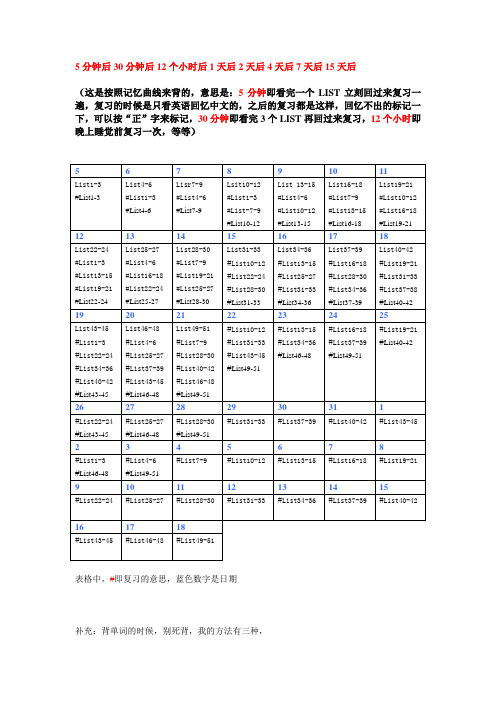
5分钟后30分钟后12个小时后1天后2天后4天后7天后15天后
(这是按照记忆曲线来背的,意思是:5分钟即看完一个LIST立刻回过来复习一遍,复习的时候是只看英语回忆中文的,之后的复习都是这样,回忆不出的标记一下,可以按“正”字来标记,30分钟即看完3个LIST再回过来复习,12个小时即晚上睡觉前复习一次,等等)
表格中,#即复习的意思,蓝色数字是日期
补充:背单词的时候,别死背,我的方法有三种,
1.词根词缀法。
这是用来记大部分单词的,英语创造英语单词的人也是通过词根词缀这
个方法创造的。
2.读音法。
举个例子,illusion,听起来像“一路仙”,即一路都是神仙,很明了,而
它实际的意思是错觉,幻觉,这就很好对应了。
再比如,agony,读起来像“爱过你”,爱过你一定是“痛苦”的,那它的意思就记住了,而且不会忘。
3.联想法。
通过各种联想,比如,gloomy,沮丧的。
怎么联想呢?g想象成gg(哥哥),loom
想象成100m(100米) ,连起来,哥哥跑100米,结果得了最后名,非常沮丧。
好了,这样就记住了。
PS.写的有些草,我第一次考的时候觉得自己的词汇很不错,其实不然,考下来60都不到,原因在基础,单词和长难句就像建筑的基地,方法就像装饰,装饰再好,基地不牢,房子是会塌的,所以这一次我很重视基础,虽然只背了一次,词汇量远远不够,但是我觉得方法不错,所以也推荐给大家。
100天倒计时:考研英语攻坚复习计划.doc

100天倒计时:考研英语攻坚复习计划英语考研已经进入100天倒计时,这段时间该怎么利用,想必大家都十分焦灼,下面由我为你精心准备了“100天倒计时:考研英语攻坚复习计划”,持续关注本站将可以持续获取更多的考试资讯!100天倒计时:考研英语攻坚复习计划考研倒计时的钟声已经敲响,考生们进入了快速提升阶段并且很快就会迎来最后的冲刺。
在这个阶段破罐子破摔类型考生认为"都现在了,再无回天之力";后知后觉类型的考生在想"不急,还有时间复习",这两种心态,一个太过悲观消极,一个太过心存侥幸。
其实现阶段应该有的心态是:按部就班,不骄不躁,血拼到底。
尤其是阅读和写作两部分分值占去了总分的一半还多,建议广大考生每天保持1000words以上的阅读量,特别是临考前千万不能懈怠,一篇文章做题、对答案、分析词汇、分析长难句、分析题目设置及选项设置,建议时间在1小时左右;而写作一定要多背,多积累一些高分范文里的词汇和句子,现阶段无论多忙多累也要坚持每两周至少写1篇大作文,1篇小作文(写作时间最好按照考试时间来算,小作文安排15分钟,大作文安排30-40分钟)。
以下是考研帮为2020届考生准备了英语最后百天阶段复习规划,从点到面总结基础、强化阶段的高频考点,名师冲刺课程帮你归纳高效快速拿分高招,都现在了,也该拼一拼了。
►阶段时间:考研英语提升冲刺阶段复习,大约时间从9月1日到12月21日。
►学习内容:主要包括以下几个方面:(1)词汇、语法复习;(2)传统阅读理解;(3)翻译;(4)新题型;(5)帮学堂名师视频课程(仅限于会员专享);(6)月测+考前模拟考试(仅限于会员专享)。
►推荐课程:冲刺新题型课程、冲刺阅读课程、冲刺翻译课程、及写作高分、临考预测密押等课程。
►具体学习计划:9月任务总述及目标:1、完成2012-2015年真题"完型"部分的学习,掌握其中所有词汇、短语及语法点,重点突破词汇间的辨析及搭配关系;2、研读2012-2015年真题"传统阅读理解"部分,认知所有词汇及相关表达,重点分析长难句,做到能准确翻译成汉语;3、根据"新题型"解题技巧,演练2012-2015的新题型部分,总结自己的实战经验,以备考试之需;4、实战翻译2012-2015年真题"翻译"部分,总结其中使用到的翻译技巧,掌握出现的词汇、固定表达,重点精析涉及到的语法现象;5、总结在"完型"、"阅读""翻译""写作"部分遇到的生疏词汇及短语等表达,记录成册,形成自己独有的词汇学习资料;6、9月月测考试,考查自己现阶段水平,参考老师对试卷的详细解析,及时查漏补缺重要考点;(仅限于会员专享)7、完成翻译、阅读理解、新题型及写作部分冲刺课程的微课视频学习。
xx年考研英语最后7天冲刺复习计划

年考研英语最后7天冲刺复习计划以下《年考研英语最后7天冲刺复习计划》由出guo考研英语频道为您精心提供,欢迎大家浏览参考。
年12月28日1、复习年-年的真题词汇(完型和阅读中的);2、复习年-年的真题错题,分析错题题目类型和原因。
3、复习年-年的真题完型填空中考察的固定表达。
4、早起和睡前把年-年的完形填空各读5遍。
5、早起读一篇大作文范文10遍,晚上进行默写,默写完成之后检查拼写、表达、句式是否正确。
年12月29日1、下午严格按照考试时间做一套真题或模拟题,做完之后看看错在哪里,为什么错,按照卷子答案和解析中给出的翻译和作文对比自己所做的,看看有哪些地方可以借鉴;2、早起和睡前把年-年的完型填空各读5遍。
3、早起读一篇小作文范文10遍,晚上进行默写,默写完成之后检查拼写、表达、句式是否正确。
年12月30日1、复习年-年的真题词汇(完型和阅读中的);2、复习年-年的真题错题,分析错题题目类型和原因。
3、复习年-年的真题完型填空中考察的固定表达。
4、早起和睡前把年-年的完形填空各读5遍。
5、早起读一篇大作文范文10遍,晚上进行默写,默写完成之后检查拼写、表达、句式是否正确。
年12月31日1、复习年-年的真题词汇(完型和阅读中的);2、复习年-年的真题错题,分析错题题目类型和原因。
3、复习年-年的真题完型填空中考察的固定表达。
4、早起和睡前把年-年的完形填空各读5遍。
5、早起读一篇大作文范文10遍,晚上进行默写,默写完成之后检查拼写、表达、句式是否正确。
年1月1日1、适当放松一下。
2、复习年-年的真题词汇(完型和阅读中的);3、复习年-年的真题错题,分析错题题目类型和原因。
4、复习年-年的真题完型填空中考察的固定表达。
5、早起和睡前把年-年的完形填空各读5遍。
6、早起读一篇小作文范文10遍,晚上进行默写,默写完成之后检查拼写、表达、句式是否正确。
年1月2日1、下午严格按照考试时间做一套真题或模拟题,遇到自己之前做真题常错的题型要小心谨慎,写作文时注意运用自己之前积累的表达。
考研英语倒计时冲刺计划
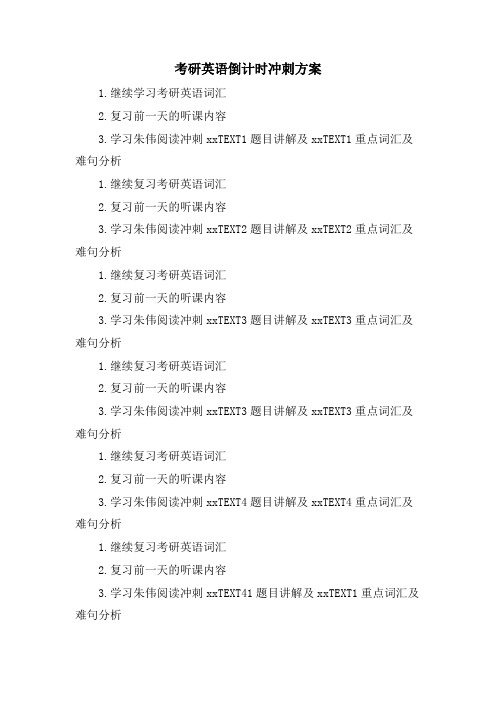
考研英语倒计时冲刺方案
1.继续学习考研英语词汇
2.复习前一天的听课内容
3.学习朱伟阅读冲刺xxTEXT1题目讲解及xxTEXT1重点词汇及难句分析
1.继续复习考研英语词汇
2.复习前一天的听课内容
3.学习朱伟阅读冲刺xxTEXT2题目讲解及xxTEXT2重点词汇及难句分析
1.继续复习考研英语词汇
2.复习前一天的听课内容
3.学习朱伟阅读冲刺xxTEXT3题目讲解及xxTEXT3重点词汇及难句分析
1.继续复习考研英语词汇
2.复习前一天的听课内容
3.学习朱伟阅读冲刺xxTEXT3题目讲解及xxTEXT3重点词汇及难句分析
1.继续复习考研英语词汇
2.复习前一天的听课内容
3.学习朱伟阅读冲刺xxTEXT4题目讲解及xxTEXT4重点词汇及难句分析
1.继续复习考研英语词汇
2.复习前一天的听课内容
3.学习朱伟阅读冲刺xxTEXT41题目讲解及xxTEXT1重点词汇及难句分析
1.继续复习考研英语词汇
2.复习前一天的新题型的听课内容
3.学习朱伟阅读冲刺xxTEXT2题目讲解及xxTEXT2重点词汇及难句分析
1.继续有所侧重地复习考研英语单词,目标是真题中的词汇、短语,以及常用词的用法。
2.继续考研真题研究,对近十年的真题以做套题的方式模拟一遍并认真分析,对考研英语真题的特点有更系统深入的研究和把握;对于阅读理解要从命题角度去掌握每一篇文章;单词、短语、长难句全部过关,解题方法熟练掌握。
3.每周至少练习一篇,题目自选,但一定要有参考范文,写完一定要坚持自己修改。
2021考研英语倒计时100天复习计划
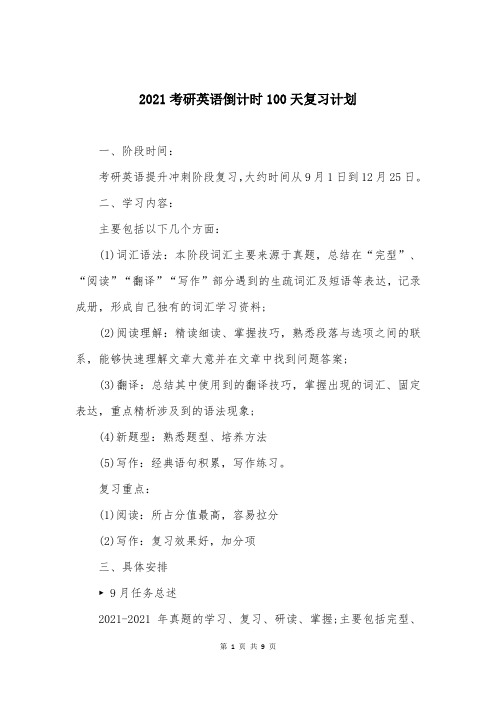
2021考研英语倒计时100天复习计划一、阶段时间:考研英语提升冲刺阶段复习,大约时间从9月1日到12月25日。
二、学习内容:主要包括以下几个方面:(1)词汇语法:本阶段词汇主要来源于真题,总结在“完型”、“阅读”“翻译”“写作”部分遇到的生疏词汇及短语等表达,记录成册,形成自己独有的词汇学习资料;(2)阅读理解:精读细读、掌握技巧,熟悉段落与选项之间的联系,能够快速理解文章大意并在文章中找到问题答案;(3)翻译:总结其中使用到的翻译技巧,掌握出现的词汇、固定表达,重点精析涉及到的语法现象;(4)新题型:熟悉题型、培养方法(5)写作:经典语句积累,写作练习。
复习重点:(1)阅读:所占分值最高,容易拉分(2)写作:复习效果好,加分项三、具体安排►9月任务总述2021-2021年真题的学习、复习、研读、掌握;主要包括完型、阅读、翻译和新题型等板块9月“周计划”第一周:2021年真题第二周:2021年真题第三周:2021年真题第四周:2021年真题(1)完型部分(复习时间约15%)1.词汇整理:做完之后对常见词汇进行整理、记忆2.词汇辨析:主要是拼写相近的词汇,注意对其进行辨认3.词汇搭配:常用的词汇间的搭配,做完型时需要注意观察空白部分前后的词语4.前后一致:注意选项中的词是否在文中出现过相近词(2)阅读理解(复习时间约50%)1.常见单词整理:非常重要,词语重复出现频率高,一般在历届真题中出现3-5次的,需要熟练掌握2.长难句分析,分析句子结构,快速读懂句子意思3.精彩的句子或者段落摘录并背诵,以便写作文的时候可以参考借鉴4.熟悉选项设置,一般都是按照段落来排列的,学会找段落、找原文5.能够复述文章的中心大意、每段文章的主题句和意思(3)翻译(复习时间约10%)1.写不出的词语掌握拼写2.注意常用语法与句子结构3.独立完成翻译之后和答案比对,找出不足(4)作文(复习时间约20%)1.熟悉题目、试着按照考试时间完成作文;参考阅读理解的优秀段落、句子,自己独立完成写作2.背诵范文作文(5)新题型(复习时间约5%)演练2021-2021的新题型部分,总结自己的实战经验,以备考试之需►10月任务总述1、开始做模拟题,坚持每周一套;严格按照考试要求时间180分钟来完成试卷;对照答案进行精读,总结词汇、短语、常错的语法、句型,背诵高分范文;2、参考模拟试卷:张剑考研英语一、二模拟题、新东方·考研英语培训教材·2021考研英语全真模拟试卷、星火·考研英语全真试卷-10套真题等10月“周计划”第一周:2021年真题(1)按照考试时间180分钟完成试卷,对自己进行测试,找到前期复习的漏洞与不足(2)仔细研读,根据之前所做真题笔记,再次归纳总结没有掌握的单词、短语第二周:模拟题1第三周:模拟题2第四周:模拟题3模拟题复习策略:完型、阅读等都按照自己总结的方法技巧来做,把握好时间,按时完成,优秀范文整理背诵,不用每篇都一字不落地背诵,可以摘抄优秀句子或者段落。
- 1、下载文档前请自行甄别文档内容的完整性,平台不提供额外的编辑、内容补充、找答案等附加服务。
- 2、"仅部分预览"的文档,不可在线预览部分如存在完整性等问题,可反馈申请退款(可完整预览的文档不适用该条件!)。
- 3、如文档侵犯您的权益,请联系客服反馈,我们会尽快为您处理(人工客服工作时间:9:00-18:30)。
4、写作。
四六级的写作可以说就是考议论文,议论文就是分三段每一段的句首的作用举重若轻。
所以背作文框架很重要。
5、翻译。
同样,将历年真题一道一道的认真做下来,每做完几年的就做一个对比,会发现知识点都是重复出现的,所以翻译相对简单。
另外,如果认为背单词太累且记不住,还可以尝试这样一种方法从基础阶段就开始做真题。
在阅读中去背单词将所有不会的单词都记录下来,整理到本子上,背就可以了。
但是这种方法并不是很扎实,因为既然想考六级了,就是想考研了,基础还是要打牢比较好。
2016考研倒计时开启2016考研倒计时开启ﻭ
ﻭﻭ
大纲公布后,2016考研也开启了百天倒计时状态。
眼看日历上剩下的日子从三位数变成两位数,考研的小伙伴们有没有开始紧张了呢?其实,剩下的这段时间非常关键,只要规划得好、利用的好,哪怕前期复习效果不理想,也可以在这段时间发生逆转,为胜利增添筹码!那么,这么关键的复习期该如何规划呢?都教授
给你点儿建议:
ﻭﻭ
大纲公布后—9月底:领会大纲精神,调整复习方向ﻭ
ﻭ
今年的大纲公布时间是9月18号,虽然比往年晚了几天,但好在大部分学科变化不大。
新大纲到手后,我们的首要任务就是要解读大纲、领会大纲精神,这对于指导我们接下来的复习至关重要。
今年大纲变化最大的依然是政治,涉及许多考点的移动和增删,除了要把这部分变动考点重点掌握之外,对那些一贯未变的重点考点依然不能忽视,最好从整体上把新大纲从头到尾捋一遍。
其他科目,英语、数学、统考专业课等,大纲变化基本都不大,但也要认真领会大纲精神,明确考试方向和要求,以便更有的放矢地指导接下来的复习。
ﻭ
10月—11月:继续巩固强化,同时开启模拟练习
ﻭ
时间进入10月份以后,无论如何,复习都不能找借口松懈了。
10、11月,这是你最后可以用来全身心投入复习的两个月,这段时间把握好了,将很可能是考场上帮助你拉分的关键。
建议大家这段时间仍以巩固强化为主,对于自身的优势科目,要保持状态不放松,而对于弱势科目或薄弱环节,则要重点强化,利用这最后的机会弥补一下。
此外,在做题方面,有必要开启模拟训练了,不管是用真题还是模拟题,最好模拟考试状态、掐着时间去做,一方面锻炼自己的做题速度,一方面锻炼考场心态,发现任何问题都可以及时调整应对。
当然这段时间内,你还需要完成两件大事:网上报名和现场确认。
12月:保持状态,向最后的目标发起冲刺ﻭ
ﻭ
进入12月,考试的氛围已经非常浓郁了,这段时间可能有的人会开始浮躁、紧张,甚至放弃复习,坐等考试到来。
都教授要提醒大家:最后这段时间,最重要的就是要保持状态,哪怕复习效率不高,也要按照平时的作息,把状态保持下去,不宜过紧或过松。
人体就像一架机器,按照习惯了的速度运转是最好的选择,否则临时调整反倒容易出现各种问题,得不偿失。
不管是什么样的复习计划,适合自己最重要。
以上只是给大家一个大致的方向参考,在具体安排和执行中,还要以个人现实为准。
毕竟,到了这个时候,你的
目标只有一个:向着最后的胜利,冲击!
ﻭ。
